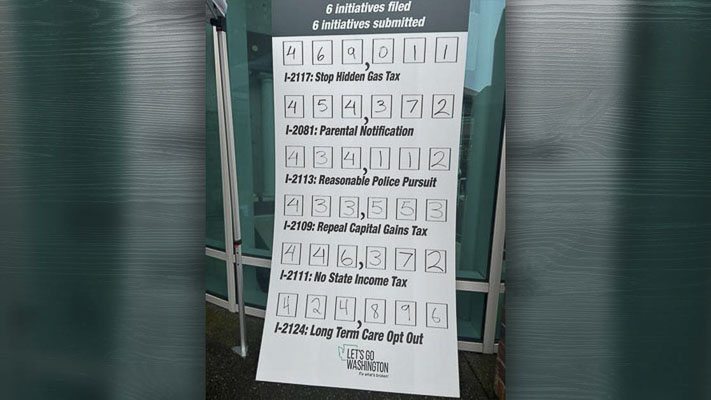
Todd Myers of the Washington Policy Center believes it seems strange that the people associated with the ‘No’ campaign would sell their credibility so cheaply
Todd Myers
Washington Policy Center
Remarkably, supporters of Washington’s new CO2 tax are still trying to argue that it doesn’t have an impact on energy prices. This time, the “No on I-2117” campaign is claiming that removing the largest energy tax in state history won’t reduce prices.

And there is yet more evidence that the Inslee Administration knew very well that putting a tax on CO2 emissions would significantly increase prices.
It is more evidence that Washington’s climate policy was justified – and is being defended – using arguments that are intentionally misleading.
In 2018, Governor Inslee proposed a flat carbon tax that would start at $20 per metric ton of CO2 in 2020. Just three years before Washington’s new CO2 tax, known as the Climate Commitment Act (CCA), was passed, the governor’s staff was candid that it would increase energy prices.
The governor’s advisor Lauren McCloy admitted that “Yes there are going to be costs. There are going to be impacts to energy prices.” An article in The News Tribune noted, “While the tax would be paid by power plants and fuel importers, Inslee’s staff predicted some of the costs would pass on to consumers and result in a hike in the price of electricity, natural gas, and gasoline for many people starting in 2020…”
How much did they predict costs would increase? Inslee’s staff told The News Tribune that “consumers could see an increase in costs of 4 to 5 percent on electricity, roughly 10 percent on natural gas used in homes and 6 to 9 percent on gasoline.”
At the time, gasoline prices in the Seattle area averaged about $2.84 per gallon, so a six percent increase in prices would amount to an increase of 17 cents per gallon. At $20 per metric ton, a carbon tax would add 17.6 cents per gallon of gasoline. Deducting 10 percent for ethanol content would reduce that to about 16 cents per gallon.
Once again, the Inslee Administration admitted that a tax on CO2 emissions would increase energy prices, that those costs would be passed on to consumers, and that the price increase would be almost identical to the price implied by $20/MT of CO2.
The 2018 comments echo those expressed by Inslee’s policy advisor in 2014 when he said that a CO2 tax of $52/MT CO2 would increase gasoline prices by 38 cents per gallon.
These numbers demonstrate once again that the Inslee Administration and staff at the Department of Ecology were simply dishonest when they claimed the impact of the CO2 tax on gas prices would be small or “pennies.” Just three years earlier, they were open that a CO2 tax would increase prices significantly.
Despite repeatedly admitting that CO2 taxes increase the price of energy – which is their explicit purpose – the “No on 2117” campaign to keep the CO2 tax in place now claims that repealing the tax “Does Nothing to Lower Energy Costs for Washingtonians.” There is no way to steel-man this argument. The Inslee Administration has repeatedly admitted that the CO2 tax has increased energy prices. Even the election-year rebate checks are premised on the fact that energy prices have increased due to the tax. There is also real-world evidence that when the CO2 price declined this year the gap between Washington and Oregon’s gas prices narrowed – direct evidence that cutting the taxes cuts energy prices.
Of course, opponents of repealing the CO2 tax don’t have to make arguments that directly contradict what they’ve said in the past. There are arguments for a CO2 tax. I personally have made them, although I argued that any CO2 tax should be revenue-neutral.
The fact that the No campaign can’t make arguments that are plausible demonstrates they know the law is unpopular and their only hope of keeping it in place is intentionally misleading the public.
The failure of the Inslee Administration to pass major climate legislation in the first six years of his term appears to have convinced the governor and those around him that the only political strategy was dishonesty. The examples of Inslee’s own advisors repeatedly giving accurate assessments of the cost of a CO2 tax are a stark contrast to recent messages that have been repeatedly proven false.
It seems strange that the people associated with the No campaign would sell their credibility so cheaply, but there doesn’t seem to be much accountability for dishonesty in politics these days. The fact that there is so little incentive to have honest conversations about climate policy is a big reason Washington has repeatedly failed to meet its own climate goals, and why – win or lose – the discussion about climate policy going forward won’t get any better until politicians and activists feel pressure to be honest about the tradeoffs.
Todd Myers is the vice president of research at the Washington Policy Center.
Also read:
- Opinion: Changes made — and not made — to WA Cares in 2025Elizabeth New (Hovde) outlines 2025 changes to WA Cares, including new automatic exemptions and eligibility tweaks. She also warns that exemption rules could shift, potentially forcing some private insurance holders back into the program.
- Letter: Can the president direct the U. S. Military to strike another country?Vancouver resident Jim McConnell questions the Constitutionality of presidential military actions without Congressional approval, citing historical precedents and legal opinions in response to President Trump’s 2025 strike on Iran.
- Letter: Social Security applauds passage of legislation providing historic tax relief for seniorsAnna Miller shares a letter celebrating new legislation that eliminates federal income taxes on Social Security benefits for nearly 90% of recipients. The bill also enhances deductions for seniors, fulfilling a key promise on retirement protection.
- POLL: What’s the biggest concern you have with the current I-5 Bridge replacement plan?As costs rise and Oregon’s funding fails, concerns mount over the current I-5 Bridge replacement plan. Clark County Today asks readers: what’s your biggest concern?
- Opinion: Your cost of living is about to go up as the majority party’s new taxes and fees kick inRep. John Ley shares a legislative update on rising costs across Washington, including gas taxes, childcare, housing, and business impacts. He highlights concerns about state spending and new transportation policies.










